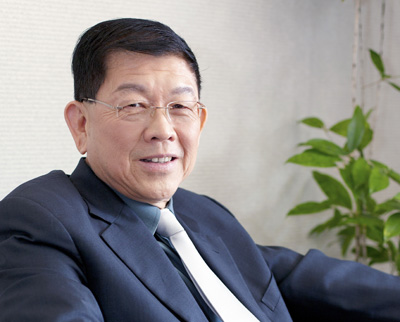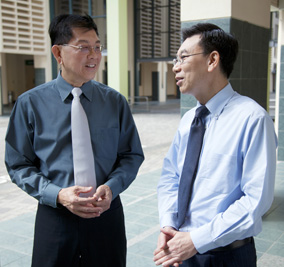Why Singapore’s English Teachers Should Embrace Singlish, Not Fight It
Is it time for Singaporean educators to embrace Singlish as a legitimate learning tool? What the Research […]
Read More
Motivation drives all that we do, including learning. We ask NIE Director Professor Lee Sing Kong how teachers can motivate students through their pedagogy, professionalism and passion.

Professor Lee Sing Kong knows all about the power of motivation.
For a period in his life, Prof Lee had to juggle both work and studies. During weekdays, he was a civil servant at the Parks and Recreation Department. But at night and during the weekends, he was a PhD student in plant biotechnology.
“I’ve a great interest in that subject,” Prof Lee enthuses. He wanted to clone roadside trees that flower at the same time to create a “sakura effect” in Singapore.
“My interest is my motivational factor. It drove me to work weekends and nights, forgoing good TV programmes and sporting activities just to focus on my studies,” he recalls. “Motivation is important; it’s an emotional thing.”
As he narrates his personal experience, Prof Lee gets to the core of the matter. “Motivation” and “emotion” both derive from the same Latin word, motere, which means “to move”.
Motivation is the force that initiates and drives our behaviour, and it keeps us going even if we encounter obstacles. In the context of learning, it is the key ingredient for success.
But how can we motivate students, especially those who are not doing well? Perhaps the best way is to first engage them emotionally, and then intellectually.
Here, Prof Lee shares with us another story. Years ago, he supervised a student teacher who was teaching a Normal (Technical) class. She struggled to capture her students’ attention. Worse still, her class became smaller as days went by.
“I told her, ‘Talk to your students informally and engage them. Find out what are their interests.’”
After she realized that her students loved football, the student teacher watched a match just so that she could talk to them about it in class the next day. The students were amazed by her.
“It was like a great gathering of football enthusiasts in the classroom! By the third lesson, whatever the teacher said, the students listened with great enthusiasm,” Prof Lee recalls with a smile.
But the job of motivating students does not stop at just building rapport with them. “Today, we want our students to enjoy the process of learning, and not look at learning as a chore,” says Prof Lee. This is especially so because for today’s generation, learning will extend far beyond schooling.
The strictest of norms must be challenged in this new landscape.
– Prof Lee Sing Kong, Director of NIE
In our world today, human knowledge is growing at an exponential rate. To keep up, foundational knowledge and skills such as literacy and numeracy are still needed, but are not enough.
Instead, says Prof Lee, we have to teach students to learn how to learn and to be self-directed learners.
At the same time, he describes this generation of students as EPIC learners (those who learn in ways that are experiential, participatory, image-driven and connected to the world).
To teach them, teachers will have to transfer the ownership of learning to students. They should not be made to learn, but actively want to learn.
This is where teachers should tap into their knowledge of their students’ learning profiles, and then strategically wield pedagogy as a form of motivation to keep them going.
“When your pedagogy aligns with their preferences for learning, that is what can motivate them,” he says. “They become motivated learners; they become active and engaged.”
Ever since he became Director of NIE in 2006, Prof Lee has been positioning the institute as one that responds to the changing world.
To prepare student teachers to teach EPIC students, he wants them to learn like one too. The NIE classrooms and library have been transformed into learning spaces that encourage group work and collaboration. Many of the spaces are also equipped with ICT tools to encourage the use of visuals for learning.
“I often say this: The strictest of norms must be challenged in this new landscape,” Prof Lee says. Instead of silence in the NIE library, he wants it to be an inviting space where learners gather and work together over cups of coffee, with their electronic devices connected to the Internet.
“Connectedness is what these students want,” he explains. “If they can stay connected, they will be motivated.”
The NIE faculty is also changing the way they teach student teachers. The faculty members are teaching concepts and then getting their students into groups to take over the processes of learning and application.
“If these skills in self-directed and collaborative learning can be picked up, our student teachers will go into schools to engage their students in the same process,” Prof Lee says.
When your pedagogy aligns with their preferences for learning, that is what can motivate them.
– Prof Lee on teaching the students of today
 In June this year, Prof Lee will step down as NIE Director and hand over the reins to Dean of Teacher Education Professor Tan Oon Seng.
In June this year, Prof Lee will step down as NIE Director and hand over the reins to Dean of Teacher Education Professor Tan Oon Seng.
Of his legacy, Prof Lee says he had worked to provide a positive learning experience for all student teachers in NIE. They can, in turn, bring about the same kind of experience to their own students.
“We prepare teachers to be change agents in the school,” he says. “When they go to the schools, they will bring changes to the way curriculum is being delivered to motivate students to become engaged. And they will be the ones who will bring in ideas on how to reconfigure the classrooms and adopt new technological tools.”
The effort that a teacher puts in to provide the best learning environment for their learners will not go unnoticed. Very often, students are moved to do their best if they can see how passionate their teachers are in their work.
As Prof Lee puts it in his farewell email to all NIE staff: “The best teacher is one who can inspire the heart of every student and through this, change their lives not only in the classroom, but beyond.”
Useful Resource
Low, E. L., Joseph, J., & Atienza J. C. (2010). Perspectives in motivating educators and learners: A report of the NIE TE21 roundtable discussion. Retrieved from https://www.nie.edu.sg/files/RoundtableReport_Final.pdf